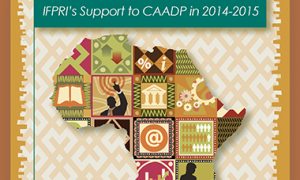Few challenges facing the global community today match the scale of malnutrition, a condition that directly affects one in three people.
Search
Making SMARTer commitments to nutrition action: Global nutrition report guidance note
The Global Nutrition Report, an independent accountability mechanism for progress and action on nutrition, calls on all actors to make SMART Commitments to Nutrition Action—that is, commitments that are specific, measurable, achievable, relevant,
The world is off track to reach global targets on nutrition, but we can reverse that trend and end malnutrition by 2030
This strategy document identifies the International Food Policy Research Institute’s (IFPRI’s) priority areas of capacity development for food and agricultural policy research, policy formulation, and implementation.
This report assesses trends in investments, human resource capacity, and research outputs in agricultural R&D.
In 2011, in collaboration with the United States Agency for International Development (USAID), the Democratic Republic of Congo’s government launched the Food Production, Processing, and Marketing project—which aimed to raise incomes and improve f
Factors affecting performance of agricultural extension
Perspectives on climate effects on agriculture
En vísperas de entrar en la era post 2015 de los Objetivos de Desarrollo Sostenible (ods), el mundo debe hacer frente a problemas aparentemente inextricables. La malnutrición no debería estar entre ellos.
ÀMEDIDA QUE ENTRAMOS NA ERA PÓS-2015 DOS OBJETIVOS DE DESENVOLVIMENTO SUSTENTÁVEL (ODSS), O MUNDO ENFRENTA INÚMEROS DESAFIOS APARENTEMENTE insuperáveis. A desnutrição não deveria ser um deles.
Tandis que nous entrons dans l’ère des objectifs de développement durable (ODD), le monde est confronté à de nombreux problèms apparemment insolubles. La malnutrition ne devrait pas en faire partie.
As we move into the post-2015 era of the Sustainable Development Goals (SDGs), the world faces many seemingly intractable problems. Malnutrition should not be one of them.
As we move into the post-2015 era of the Sustainable Development Goals (SDGs), the world faces many seemingly intractable problems. Malnutrition should not be one of them.
Addressing human capital development in public agriculture extension in Southern Africa: Assessing Mozambique’s experience
The purpose of this study is to review the human capital development (HCD) challenges in agricultural extension in the southern Africa region, focusing on Mozambique as a country case study.
Highlighting achievements by IFPRI and its partners in support of the CAADP implementation agenda




